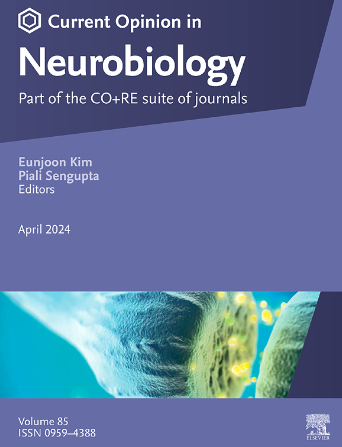可塑性的潜在机制在睡眠期间被上调
IF 5.2
2区 医学
Q1 NEUROSCIENCES
引用次数: 0
摘要
睡眠被认为在学习和记忆中起着重要作用,但睡眠促进可塑性的机制尚不清楚。即使在神经元功能没有可塑性变化的情况下,许多与可塑性相关的分子、细胞和生理过程在睡眠期间也会上调。因此,睡眠可能是一种状态,在这种状态下,潜在的可塑性机制准备对先前清醒期间的新体验做出反应。许多与可塑性相关的过程可以促进突触的增强和减弱。在睡眠期间激活的信号通路可能与蛋白质补体相互作用,由先前清醒经验的内容决定,以建立可塑性的极性。此外,睡眠期间神经元尖峰模式的精确再激活可能与正在进行的神经调节、树突和网络活动相互作用,从而增强或削弱突触。在这篇综述中,我们将讨论睡眠提高潜在可塑性机制的观点,这种机制驱动双向可塑性取决于先前的清醒经验。本文章由计算机程序翻译,如有差异,请以英文原文为准。
Latent mechanisms of plasticity are upregulated during sleep
Sleep is thought to serve an important role in learning and memory, but the mechanisms by which sleep promotes plasticity remain unclear. Even in the absence of plastic changes in neuronal function, many molecular, cellular, and physiological processes linked to plasticity are upregulated during sleep. Therefore, sleep may be a state in which latent plasticity mechanisms are poised to respond following novel experiences during prior wake. Many of these plasticity-related processes can promote both synaptic strengthening and weakening. Signaling pathways activated during sleep may interact with complements of proteins, determined by the content of prior waking experience, to establish the polarity of plasticity. Furthermore, precise reactivation of neuronal spiking patterns during sleep may interact with ongoing neuromodulatory, dendritic, and network activity to strengthen and weaken synapses. In this review, we will discuss the idea that sleep elevates latent plasticity mechanisms, which drive bidirectional plasticity depending on prior waking experience.
求助全文
通过发布文献求助,成功后即可免费获取论文全文。
去求助
来源期刊

Current Opinion in Neurobiology
医学-神经科学
CiteScore
11.10
自引率
1.80%
发文量
130
审稿时长
4-8 weeks
期刊介绍:
Current Opinion in Neurobiology publishes short annotated reviews by leading experts on recent developments in the field of neurobiology. These experts write short reviews describing recent discoveries in this field (in the past 2-5 years), as well as highlighting select individual papers of particular significance.
The journal is thus an important resource allowing researchers and educators to quickly gain an overview and rich understanding of complex and current issues in the field of Neurobiology. The journal takes a unique and valuable approach in focusing each special issue around a topic of scientific and/or societal interest, and then bringing together leading international experts studying that topic, embracing diverse methodologies and perspectives.
Journal Content: The journal consists of 6 issues per year, covering 8 recurring topics every other year in the following categories:
-Neurobiology of Disease-
Neurobiology of Behavior-
Cellular Neuroscience-
Systems Neuroscience-
Developmental Neuroscience-
Neurobiology of Learning and Plasticity-
Molecular Neuroscience-
Computational Neuroscience
 求助内容:
求助内容: 应助结果提醒方式:
应助结果提醒方式:


